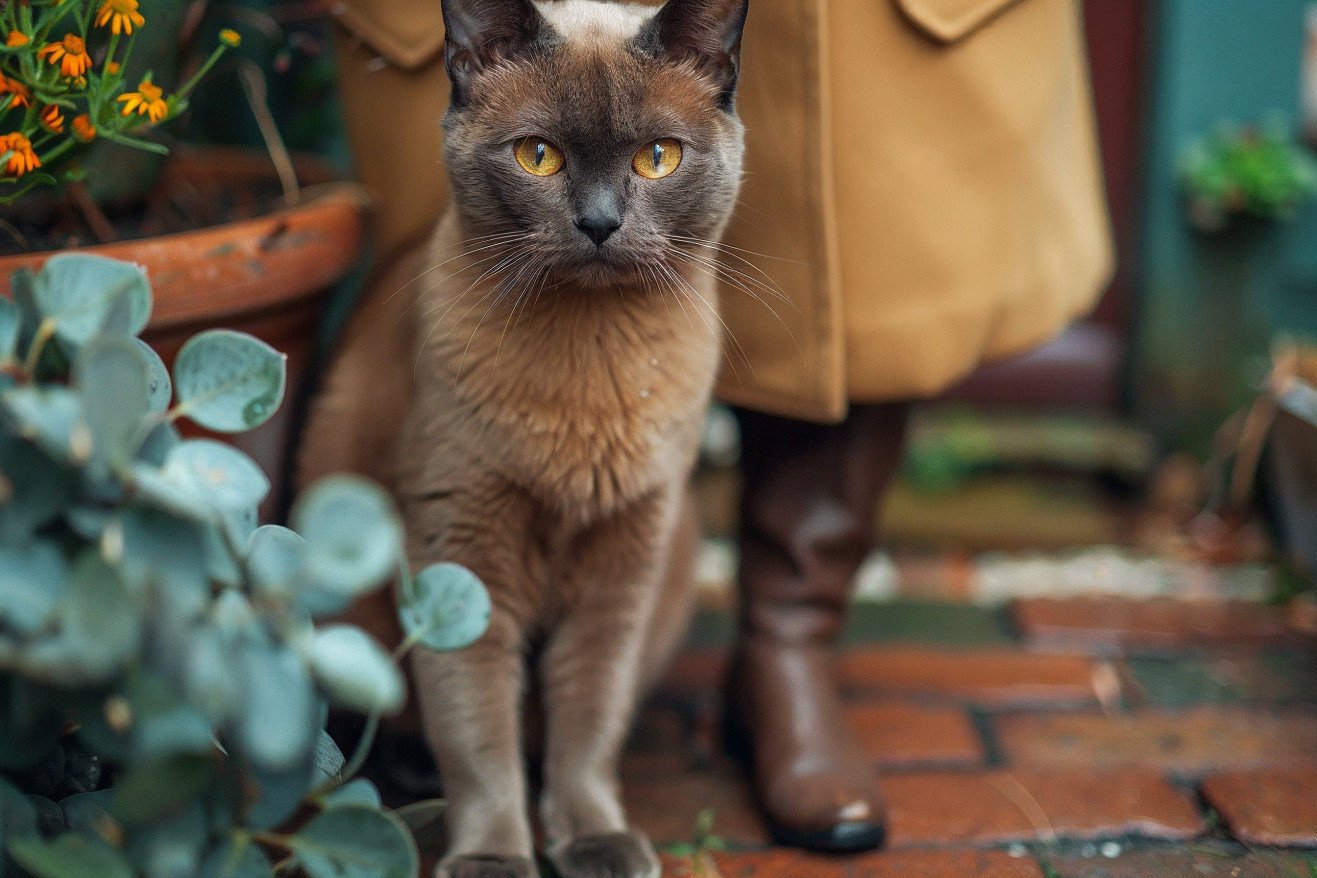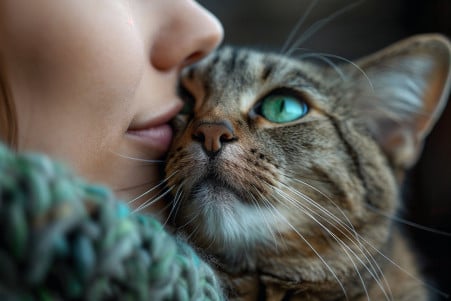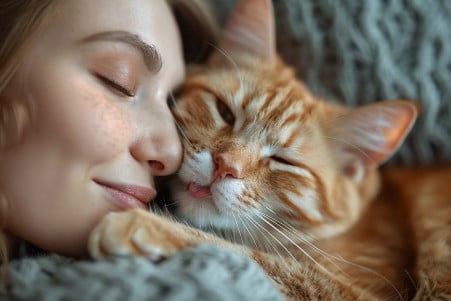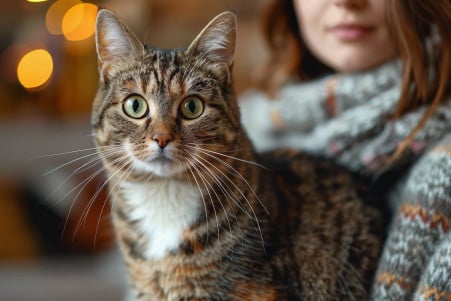Why Do Cats Headbutt? The Many Interesting Reasons
24 April 2024 • Updated 23 April 2024

If you’ve ever wondered why your cat insists on headbutting you, you’re not alone. But is this just another example of a cat’s strange behavior, or is there a deeper reason behind it? Those sweet headbutts from your cat are actually an instinctive way for them to spread pheromones and mark you as part of their colony. It's a bonding behavior that shows affection, allows scent exchange, and helps cats feel secure in their territory and social group.
We'll delve into animal behaviorist studies to learn about the many interesting reasons behind this lovable cat quirk. This knowledge will help you better understand the motivations and science behind headbutting and deepen your understanding of your cat’s mind and the natural behaviors that strengthen your relationship. Get ready to fall in love with this sweet ritual all over again.
Why do cats headbutt people?
The Science of Scent: How Headbutting Helps Cats Mark Territory
The reason behind headbutting is based on a cat's natural instinct to mark its territory. Cats have scent glands on their faces, including on their cheeks, chins, and foreheads. When they headbutt or bunt against people or objects, these glands release pheromones - chemical signals that mark their surroundings with a unique scent.
By depositing these pheromones through headbutting, cats are essentially stating that they own their environment and everything in it, from people to furniture. This creates a "colony scent" that lets the cat know they're in a safe, secure, and familiar environment. Essentially, it's a way for the cat to map out their territory and ensure they have safe spaces.
In multi-cat homes, headbutting also has a social purpose. Cats will headbutt each other to mix their scents and create a colony scent. This way, the cats can smell each other and know they're part of the same group. This also helps cats bond with their human family members. When cats headbutt their owners, they're including them in the colony scent, which helps cats and humans bond.
Headbutting as a Sign of Trust and Affection
While scent marking is an instinctive behavior, headbutting is also a purposeful way for cats to show their humans that they care about them. According to the Cole & Marmalade blog, cats only headbutt people they have close relationships with, which shows a certain level of trust and security. When cats headbutt their owners, they are letting them know that they feel comfortable and secure in their relationship.
As PetMD points out, cat headbutts are a form of scent marking, but they are also a way for cats to connect with people they are familiar with. In fact, the Catsan Cat Litter website explains that cats won't get as close to people they don't trust and like. So, when a cat headbutts their owner, it's a sign that the cat feels close to that person. In fact, it's a sign that the cat feels closer to that person than to anyone else.
How to React to Your Cat's Headbutts: Dos and Don'ts
You can generally safely and even positively reciprocate your cat's headbutt. Vet Organics notes that accepting your cat's affection is an important part of the bonding process and that your response can help make the bond stronger for both of you.
That said, it's important to always pay attention to your cat's body language to make sure they're receptive to your response. The Catsan Cat Litter website suggests you can try to return the headbutt, but let your cat decide if they want to take things further.
You should never forcefully headbutt your cat, as this can be interpreted as aggression. The Wildest warns against this, noting that cats can see overly aggressive responses as threatening.
If your cat is being too pushy with their headbutts, it's best to respond with positive interactions to let them know everything is okay. Vet Organics blog explains that if your cat is headbutting you too much, it may be a sign that they're feeling insecure, and in this case, consistent positive interactions can help them feel more secure.
Changes in Headbutting Behavior: What It Could Indicate
Although headbutting is a positive behavior, changes in the frequency or intensity of headbutting may be indicative of other things that are going on with your cat. The Rover.com blog explains that if your cat's headbutting decreases over time, it could be a sign that your cat's level of comfort has changed or that they are dealing with a health issue. On the other hand, Yahoo Lifestyle points out that if your cat is headbutting too much or too hard, it could be a sign that they are uncomfortable, stressed, or dealing with an underlying problem.
One behavior that is definitely not the same as headbutting is head pressing, which is when a cat repeatedly presses their head against a hard object. The Vet Help Direct website notes that head pressing is a sign of neurological damage and should be addressed by a vet right away. In addition to head pressing, pet parents should look out for other worrisome symptoms like seizures, changes in eyesight, compulsive behaviors, or disorientation.
Pet parents can learn a lot about their cat's overall well-being by paying close attention to changes in their cat's headbutting behavior, as well as their other behaviors and body language. The Rover.com blog recommends that pet parents talk to a vet if they notice any worrisome changes to make sure that there are no underlying medical issues and to ensure that their cat is as comfortable and healthy as possible.
Reading Into the Force: What Different Headbutts Mean
The strength of a cat's headbutt can depend on the cat's individual personality and the context of the interaction. Vetstreet explains that cats with more confident, outgoing personalities tend to headbutt more forcefully than their more timid, reserved counterparts.
Softer, slower headbutts are a sign of a cat that's feeling calm and loving. The Tiniest Tiger says that this kind of headbutting, which is also called "bunting," is a form of positive interaction where a cat uses its head to express happiness and mark its territory with people or objects.
On the other hand, Great Pet Care points out that stronger headbutts may be a sign that a cat is feeling more excited or needy. The strength of the headbutt can help you understand how the cat is feeling and what it wants in the moment.
By paying attention to the strength of the headbutt in addition to the cat's other body language, pet parents can learn a lot about what their cat is trying to communicate. This can help them better understand their cat's needs and emotions and further deepen the special bond between a cat and its human.


